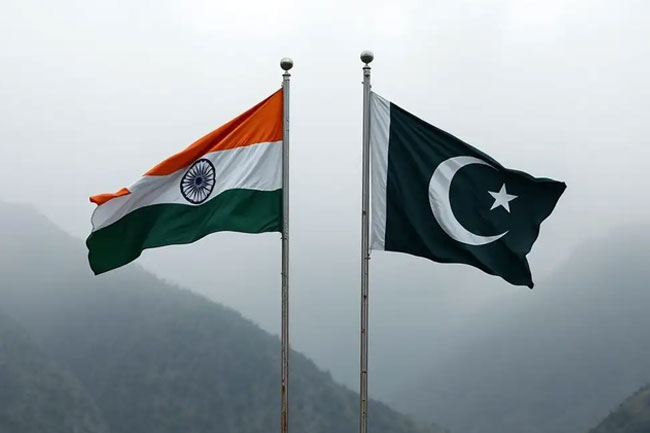India has conducted missile strikes against targets in Pakistan and Pakistan-administered Kashmir, marking a significant escalation between the two nuclear-armed neighbors. The military operation, codenamed "Operation Sindoor," by India was launched in "retaliation" for a deadly millitant attack on Indian tourists in Kashmir last month.
The Military Operation
In the early hours of Wednesday, May 7, 2025, Indian forces carried out coordinated strikes targeting what India described as "terrorist infrastructure" in Pakistan and Pakistan-administered Kashmir. India's Ministry of Defence characterized the operation as "focused, measured, and non-escalatory," stating that nine locations were struck without affecting any civilian, economic, or military sites in Pakistan.
The 23-minute operation reportedly employed Rafale jets armed with SCALP missiles and AASM Hammer bombs to strike locations in Pakistan administered Kashmir (Muzaffarabad and Kotli) and Pakistan's Punjab province (Bahawalpur).
The strikes crossed both the Line of Control and the international border, representing what Pakistani officials called the deepest incursion by India since the 1971 war.
"Justice is Served," declared the Indian Army in a statement released on Twitter with the hashtag #PahalgamTerrorAttack. The name "Sindoor" appears to reference the red powder that many Hindu women wear on their foreheads after marriage, possibly alluding to the Indian women widowed in the April attack.
Pakistani Response
Pakistan has strongly condemned the strikes, with Prime Minister Shehbaz Sharif calling them an "act of war" and asserting that Pakistan "has every right" to retaliate.
According to Pakistani military spokesperson Lt. Gen Ahmed Sharif Chaudhry, six locations were impacted by 24 strikes, some in the densely populated Punjab province.
Pakistani officials claim the attacks resulted in 26 civilian casualties, including children as young as three years old, with 46 others injured. They also allege that civilian areas were targeted, including the Bilal mosque in Muzaffarabad, with damage reported by Reuters.
In response, Pakistan has conducted missile strikes on Indian-administered Kashmir and claimed to have shot down five Indian Air Force jets, including three Rafale fighters, and one drone. India has not acknowledged any aircraft losses while videos surface on social media.
Background of the Conflict
The current escalation follows the April 22 attack in Pahalgam, a tourist destination in Indian-administered Kashmir, where armed assailants killed 27 Indian civilians and one Nepali, primarily Hindu tourists. India attributed the attack to "The Resistance Front," described as an offshoot of the militant group Lashkar-e-Taiba, and accused Pakistan of supporting the attackers – allegations that Islamabad has denied.
In the aftermath of the Pahalgam attack, diplomatic relations deteriorated rapidly. India expelled Pakistani diplomats, suspended visas for Pakistani citizens, and withdrew from the Indus Waters Treaty, a 1960 water use and distribution agreement. Both nations engaged in military posturing, with Pakistan testing ballistic missiles on May 3 and India conducting military drills.
Kashmir Conflict Context
The Kashmir region, which has a Muslim majority population, has been a flashpoint between India and Pakistan since both nations gained independence from Britain in 1947. The divided territory has become one of the most militarized zones in the world, with both countries claiming it in its entirety and fighting three wars over the disputed region.
India has consistently accused Pakistan of harboring militant groups that launch attacks across the border, while Pakistan denies these allegations. The current situation represents one of the most serious escalations in recent years between the two nuclear powers.
International Reaction
The United Nations has expressed grave concern over the developing situation. Secretary-General Antonio Guterres issued a statement through his spokesperson Stephane Dujarric, saying: "The Secretary-General is very concerned about the Indian military operations across the Line of Control and international border. He calls for maximum military restraint from both countries."
Guterres emphasized, "The world cannot afford a military confrontation between India and Pakistan," highlighting the international community's anxiety over potential further escalation between the nuclear-armed neighbors.
The military actions have disrupted air travel in the region, with Pakistan closing sections of its airspace and numerous major international airlines avoiding Pakistani airspace. Several airlines have reported flight disruptions and airport closures in northern Pakistan.
Immediate Impact
The strikes have prompted evacuations in border areas. Authorities in Indian-administered Kashmir have instructed residents to leave areas considered hazardous, promising accommodation, food, and medical assistance. Meanwhile, Maryam Nawaz, the chief minister of Pakistan's Punjab province, has urged residents to stay inside their homes.
Three civilians in Indian-administered Kashmir were reportedly killed due to shelling by Pakistani forces from across the border, according to the Indian Army. Both sides have engaged in mutual shelling across the Line of Control.
Looking Forward
The Pakistani government has declared that the Indian strikes "will not go unanswered" and vowed to retaliate at "a time and place of its own choosing," warning that "the temporary satisfaction of India will be replaced by lasting sorrow."
As tensions escalate, many countries, including the United States, have reportedly been in contact with leaders of both nations in attempts to ease the situation. However, with both sides maintaining firm positions and threatening further military action, the international community remains concerned about the potential for a wider conflict between the two nuclear-armed neighbors.

Comments
Post a Comment